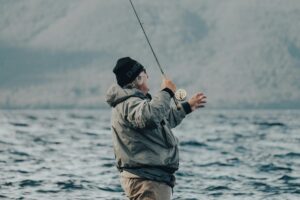Why Is Fishing So Important? A Deep Dive into Its Significance


Fishing holds a special place in the hearts of people worldwide. From being a vital livelihood for many to a recreational activity for others, fishing plays an essential role in society. But why is fishing so important? This question is multifaceted, encompassing various aspects, including economic benefits, sustainability, cultural significance, and environmental balance. In this article, we’ll explore the reasons why fishing remains a crucial activity and how it impacts our world.
Economic Benefits of Fishing
Fishing is one of the oldest industries in human history, and it remains a vital source of livelihood for millions of people. The global fishing industry generates billions of dollars annually, employing people involved in both commercial and recreational fishing. This includes jobs in fish processing, distribution, equipment manufacturing, and tourism-related activities.
In coastal areas, fishing is often the backbone of the local economy. It sustains numerous businesses, from fish markets to seafood restaurants. Moreover, fishing serves as a source of food security, particularly in countries where seafood is a staple part of the diet. The economic importance of fishing extends beyond direct employment; the industry also supports ancillary sectors such as transportation, logistics, and retail.
Fishing for Food Security and Nutrition
Around the world, fish are a primary source of protein for millions of people, especially in developing countries. It provides essential nutrients like omega-3 fatty acids, vitamins, and minerals, all of which contribute to a healthy diet. As the global population continues to grow, the demand for sustainable and affordable food sources also increases, and fishing plays a crucial role in meeting this demand.
For many communities, particularly those living in coastal or island regions, fishing is not just a food source; it is a crucial part of their cultural heritage and survival. Small-scale, artisanal fishing supports local families and provides fresh seafood that might otherwise be inaccessible.
Environmental Balance and Conservation
Fishing is not just an economic activity; it also plays a role in maintaining the balance of marine ecosystems. Responsible fishing helps control fish populations and ensures the health of oceanic habitats. Overfishing, on the other hand, has detrimental effects, leading to the depletion of particular species and disrupting entire ecosystems.
Sustainable fishing practices are essential for ensuring the future of marine biodiversity. By enforcing regulations, such as fishing quotas, seasonal restrictions, and protected areas, authorities can mitigate the adverse effects of overfishing. Many organizations work tirelessly to promote sustainable fishing methods, and these efforts are critical to preserving our oceans for future generations.
Cultural and Social Significance of Fishing
Fishing is deeply embedded in the culture of many coastal communities and indigenous groups worldwide. It is more than just a means of obtaining food; it is a tradition that has been passed down through generations. For these communities, fishing represents a connection to nature, heritage, and the rhythms of the sea.
Fishing also brings people together. Whether it’s a father teaching his child how to fish or a group of friends heading out on a weekend fishing trip, the act fosters strong bonds and shared experiences. The sense of community and camaraderie that comes from fishing is often celebrated through local festivals, competitions, and events.
Recreational and Mental Health Benefits
For many, fishing is a relaxing and meditative activity. Anglers find peace in the quiet moments spent waiting for a bite, surrounded by the natural world. Studies have shown that engaging in recreational activities, such as fishing, can reduce stress, improve mental health, and provide an escape from the demands of daily life. It allows individuals to connect with nature, unplug from technology, and focus on the present moment.
Moreover, fishing is a highly accessible hobby. People of all ages and abilities can enjoy it, whether from a boat on the open water or from the banks of a river. As a result, fishing has become a popular recreational activity, with millions of individuals participating in it worldwide. This widespread participation contributes to both physical and emotional well-being.
Fishing’s Role in Tourism
Fishing also plays a significant role in the tourism industry. From world-famous sport fishing destinations to local fishing expeditions, tourists flock to fishing hotspots for the opportunity to catch unique or trophy fish. This type of tourism not only brings enjoyment to those involved but also generates revenue for the region, supporting local businesses, accommodations, and services.
Sport fishing, in particular, has grown into a global industry, with professional competitions drawing large crowds and offering substantial prize money. In places such as Alaska, the Caribbean, and New Zealand, fishing tourism is a vital component of the local economy. By combining leisure, sport, and nature, these fishing destinations attract millions of visitors each year.
The Future of Fishing: Challenges and Opportunities
As the world faces significant challenges, including climate change, pollution, and dwindling fish stocks, the future of fishing hinges on adopting responsible practices. Overfishing, illegal fishing, and habitat destruction continue to threaten marine ecosystems, making sustainable fishing practices more critical than ever.
Innovation in fishing technology presents new opportunities to enhance efficiency and reduce environmental impact. Techniques such as fish farming and aquaculture are becoming increasingly popular, helping to relieve pressure on wild fish populations. However, these methods also require careful management to prevent negative consequences for ecosystems and local communities.
Looking ahead, the focus will be on balancing the economic, environmental, and social aspects of the fishing industry. By embracing sustainability, supporting local communities, and maintaining conservation efforts, fishing can continue to thrive for generations to come.
Fishing is more than just a hobby or industry; it is a vital component of our global ecosystem, economy, and culture. Whether it’s feeding families, supporting economies, or preserving biodiversity, the importance of fishing cannot be overstated. However, as we move forward, it’s essential to adopt sustainable fishing practices to protect our oceans and ensure that future generations can continue to enjoy the benefits that fishing provides.

